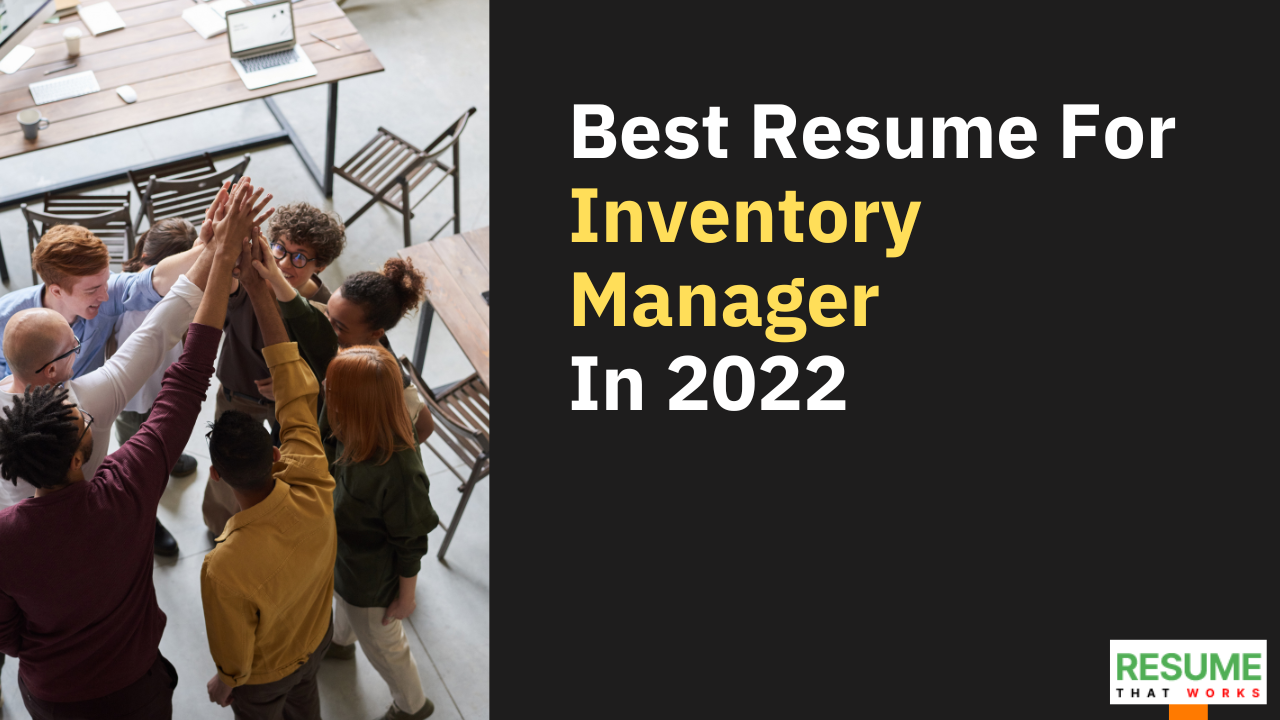Even with the specter of the great resignation looming over employers, the market has a sufficient supply of workers. As always, job seekers are finding new ways to stand out from the crowd. Many sectors are expecting growth including inventory management and administration.
Inventory management is a lucrative career for professionals, whether they are in their budding years at a small business or they have accumulated enough experience to try their muscles in a high-demanding corporate world. Large corporations such as Best Buy, Walmart, Amazon, and so on are always on the lookout to get their hands on the best talent.
This compels professionals with relevant experience and skills to both to hone their skills and redo their resumes for the specific position. It is necessary to have a bold and succinct resume to stand out from the rest of the competition.
In this post, we will take a deep hard look at;
- The responsibilities of inventory managers
- Essentials of the best inventory management resume
- Examples of professional summaries and experience descriptions
And we will top it off with frequently asked questions for our readers’ convenience.
Responsibilities Of Inventory Managers
The crux of responsibilities of a great inventory manager revolves around good record-keeping of goods and products coming in and out of the inventory. It goes without saying that great inventory managers have a keen eye for details and a calculating mindset for smooth operations.
In a modern setting, they are responsible for;
- Creating and implementing inventory control procedures
- Identifying and pinpointing supplies to notify shortages
- Ensuring product stock is above the bare minimum
- Maintaining records of deliverables and inventory reconciliation
- Data analysis to draw insightful conclusions
- Collaborating with other departments to make sure goals are materialized
Essentials Of The Best Inventory Manager Resume
A resume is not something that is unified in its structure and content. The definition of a resume can be different for different professionals. With this many nuances and variations to deal with, experts have drawn parallels with components. They can be presented and highlighted in a suitable manner without neutralizing the meanings.
So, whether you are fond of infographics or inclined toward simple structure, here are some of the essentials that you have to get right for your inventory manager resume in 2022.
-
The Right Formatting
The organization is the key to the role of inventory manager and this should be reflected in the character of the resume. A person who is adept in communication and critical thinking should put the right foot forward and choose consistent and clear formatting for his resume.
The layout of your resume is as important as the overall information that it contains. To show potential employers that you are a detail-oriented person, here is a time-tested guide to hit all the notes:
- Employ reverse chronological order for information, the most recent should come first
- Pick a clear and to-the-point resume template and customize it according to your own needs
- Start with a header with standard personal credentials, including name, contact details, and so on
- Mind the standard margins and line spacing for your resume
- Use standard font size and style for overall consistency
Pro Tip: Make sure you check all the variables on your resume before saving it. Also, it is best to save in PDF format to avoid accidental edits.
-
Spot-On Objectives Or Professional Summary
According to many resume experts, the professional summary could be the center of gravity for your resume. Everything revolves around it as recruiters can get a better feeling of what you will detail in your resume, or could bring to the table if hired.
It comes after the header that contains the contact details and other credentials.
There are two distinct types of summaries:
- Objective statement – this is used in entry-level resumes or for those where professionals are looking to change their career trajectory
- Professional summary – this is composed of candidates’ relevant experience in the field as it highlights the most applicable skills and experience
For a solid inventory manager resume, it is best to start with years of experience and connect them with the practice of relevant skills. Then, highlight special achievements or milestones, such as the successful completion of a project. In the end, tie it all up with specific goals or metrics you can help the company materialize.
-
Hard Hitting Experience Description
The experience section is the backbone of a resume, especially when a professional has put years in the field and has a lot to show for it.
For those who are still on the fence about how to do it on a resume, here is a step-by-step guide:
- First and foremost comes the job history and title
- Add a micro-description of what you did and how you managed inventory at each role
- Rely on data and metrics that are quantifiable in contrast to vague verbs
- Use numbers and figures where applicable
-
Solid Qualifications Section
This may seem like a simple and straightforward section for many, but it can pack a punch if composed masterfully. Instead of going into nitty gritty details, that could lead to nothing, here is the best way to list all your academic qualifications:
- At the top, mention the highest level of academic qualifications
- Then comes the name of the school and years of attendance
If you are not an experienced professional, then you can use this space to get into the details of your academic qualifications and link them to the excellence of your organizational skills.
-
Highlight Inventory Management Skills
Every resume has a dedicated section for key skills that are directly related to the performance in the intended role. In the case of inventory management resume, they are obvious – all skills and capabilities that can make a candidate stand out from the crowd.
For those who are doing it for the first time and don’t know how to come up with relevant skills for this section, here is how it is done:
- Gather all your professional skills and capabilities on a single paper. It does not matter whether they are relevant to this specific role or not. Just get the down in one place
- The most important ones would be the software adeptness for maintaining records, as well as hard skills for physical surveys and cross-referencing
- Many people make the mistake of leaving essential soft skills or people skills. No matter which position you are applying for in an organization, they always come in handy and entice recruiters to pick people with these skills
- Now is the time to get back to the job advertisement. Read it carefully and single out the listed skills
- By comparing both lists of the skills, see which skills are common in both
These are the definitive skills that you possess and can pave your way better toward professional excellence.
-
Supplementary Sections
After going through the above-mentioned sections, the bulk of the resume is already done. Still, there is room on the proverbial page and that should be filled with relevant information.
This can be called a supplementary section and it can house the following credentials:
- Professional certificates and diplomas – certificates such as CPIM or Excel certifications can be mentioned in this section
- Volunteer or unpaid work – if a professional has done some volunteer work or unpaid work in the industry, this is the perfect place to showcase that.
- Language and communication skills – excellence in both domestic and foreign languages and other communication skills can be highlighted here.
- Attaching A Cover Letter
There is no essential section that comes after that in an inventory manager resume. This does not mean that you cannot add value to your resume by augmenting it with a cover letter.
A cover letter is more descriptive than a resume but it relies on the same information that is presented in a resume. It has three distinct sections, starting from what a professional has already done, what he intends to do in the new organization, and how he would add value to the operations and processes.
Here are some solid tips to compose a result-yielding cover letter:
- The right and consistent formatting is the part and parcel of a cover letter
- Since it is about enticing and grabbing the attention of the recruiter, start with a bang!
- Do not hesitate to showcase your skills and capabilities by highlighting your skills and accomplishments from the past
- Offer services or leave a “cliff-hanger” in the closing lines
- The cover letter should be bold and succinct
To create an overall consistent experience, you can match the formatting of your cover letter with that of your resume, and they both will look like two parts of one whole.
Examples Of Professional Summaries
We have shed ample light on the importance and structure of professional summaries in the relevant section. This time, we will put the advice into action by providing concrete examples to the readers.
- Accomplished inventory manager with over eight years of industry experience in a fast-paced organization. Quite adept in overseeing staff and enhancing work practices to streamline processes and operations. Well-versed in management and minimizing costs and logistic expenditures
- A qualified professional in inventory management with over 10 years of proven experience. Highly skilled and adept in supply chain management by securing relations with material suppliers and vendors. Enhanced worker capacity by improving supply management practices and procedures.
Examples Of Experience Description Section
The inventory manager position requires substantial experience as the eligibility criteria. Barring that experience, candidates do not have a shot at the dream position in the new organization.
If you are still on the fence about what to add and how to add content in this section, here are three examples of experience descriptions for your inventory manager resume:
- Devised detailed reports for monthly logs and benchmarks for the company’s inventory to ascertain costs and expenses
- Replenished inventory management strategies by analyzing data from consumers and other stakeholders
- Collaborated with vendors and suppliers to streamline the influx of inventory for better in-store offerings during high demand season
These are some examples to learn how candidates for inventory manager positions can balance their aspirations and experience succinctly and boldly.
FAQs
What are the obligations and responsibilities of an inventory manager?
As the name indicates, the foremost responsibilities of an inventory manager include planning and procurement of supplies for an organization. Whether keeping up supplies is to further add value to them or shipping them off as they are, professionals organize processes and operations for sale and resale. In addition to this, they are responsible for developing a system for streamlined shipping and receipt of items.
How can I make my previous experience stand out on my inventory manager resume?
Inventory managers require both hard and soft skills to manage their day-to-day tasks as well as devise plans for the long run. So, if you haven’t worked in the core inventory management department in the past, but in other related industries, such as supply chain management or others, they can draw parallels between the two and enhance their value by showcasing the diversity of their skills and experience.
What are some of the most sought-after skills and qualities of an inventory manager?
Following are some of the most in-demand skills in the inventory manager job:
- Data analysis and forecasting methods
- Operational knowledge of inventory management software
- Communication skills and interpersonal abilities
- Punctuality and organization
- Relevant qualification in management or administration
- Analytical mindset with a keen eye for details
- Ability to track and anticipate changes in a high-paced environment




